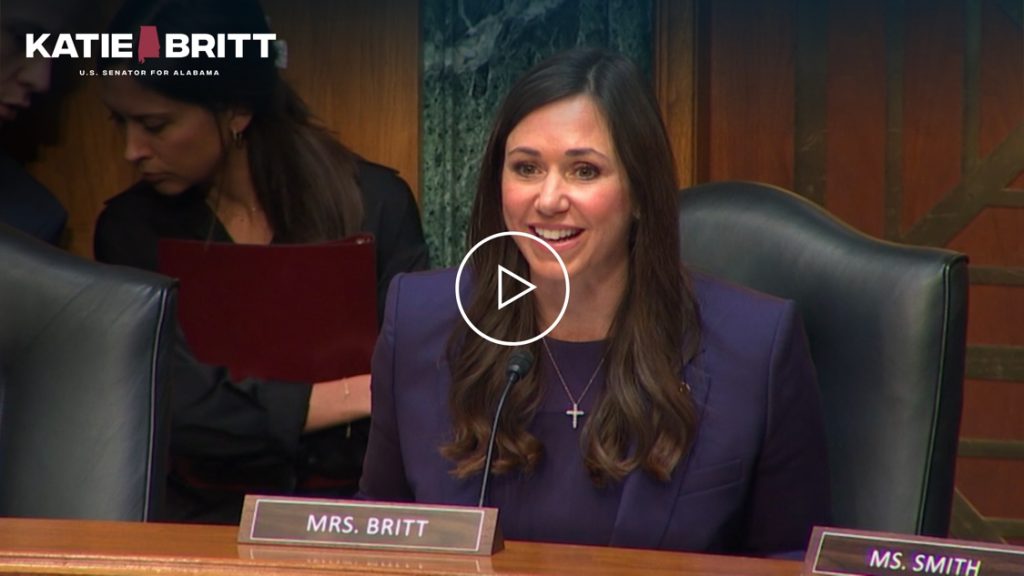U.S. Senator Katie Britt Chairs Senate Banking Subcommittee Hearing to Discuss Housing Solutions
WASHINGTON, D.C. — U.S. Senator Katie Britt (R-Ala.) today chaired her first Senate Banking Subcommittee on Housing, Transportation, and Community Development hearing, titled, “Innovation in U.S. Housing: Solutions and Policies for America’s Future.” The witnesses included Dr. Lawrence “Lars” Powell, University of Alabama Executive Director Center for Insurance and Research; Ms. Mary Tingerthal, Founder of Construction Revolution; and Mr. Dennis Shea, Executive Vice President and Chair of the Center for Housing Policy at the Bipartisan Policy Center.

Senator Britt’s opening remarks included addressing our national housing shortage, noting, “Americans are facing a squeeze when it comes to our country’s affordable housing shortage. Estimates show a deficit of up to 4.7 million housing units that we need to actually meet the demands, and an even bigger gap when it comes to affordability of rental units. We know the average first time homebuyer is no longer in their 20s, but actually in their late 30s, or even early 40s. The median home sale prices in the second quarter of 2025 was over $410,000. It’s no wonder that around 75% of U.S. households are unable to afford the median priced home … Homeownership remains a foundational element to the American Dream, but, as we can see, is out of reach for so many.”
On the availability of housing, Senator Britt noted that there is a notable shortage of homes being built in too many communities, including small towns. She also discussed excessive regulation and its direct correlation to slowing the growth of housing affordability, and the importance of solving this without expanding the federal bureaucracy. Instead, Senator Britt pointed to “unleashing locally driven solutions and cutting red tape, while empowering builders and incentivizing private sector investment.”
Senator Britt closed her introductory remarks by noting the recent bipartisan work of the full Senate Banking Committee, pointing to the recent unanimous passage of the ROAD to Housing Act and subsequent full Senate passage. She outlined how this hearing would discuss how implementing many of the solutions included in the ROAD to Housing Act can help to expand production and development and make homeownership an option for more Americans.
Senator Britt began her line of questioning by asking Dr. Powell to speak to his research on the economic benefits of Alabama’s very successful Fortified Roof program and the long-term savings effects, particularly in coastal communities. Dr. Powell responded by saying “We’ve done a number of studies, around four to five — One of them shows that on average, a Fortified house sells for 7% more than a conventional house, and that’s because you saved so much money on the insurance.” He went on to note that the up-front additional cost of Fortified construction compared to conventional construction is small, but the cost savings can be significant.
The Senator then pointed to deregulatory measures that exist in the ROAD to Housing Act, and discussed with Mr. Shea both areas of unnecessary regulation that can be addressed and ways encourage states and localities to update their zoning and permitting laws to produce more housing.
She also discussed the Family Self Sufficiency (FSS) Program under the U.S. Department of Housing and Urban Development (HUD) with Mr. Shea, noting how this is the only HUD program that “actually seeks to move individuals off government assistance.”
“… The amount of rent you pay is proportional to the income you make, and that could discourage people from getting better jobs, making more income, and the FSS program is designed to prevent that … It has been subject to a couple of studies, and the studies show strong engagement with case management savings through escrow accounts. So, it seems to be working,” said Mr. Shea. He then thanked Senator Britt for her leadership on legislation to expand participation in this program in order to move more families off of government assistance and into financial independence.
In the Senator’s last line of questioning, she highlighted the key role that manufactured and modular homes can play in addressing our housing supply shortage. She then asked Ms. Tingerthal what areas we could focus on to make off-site construction more efficient and scalable and encourage wider adoption of these homes.
Ms. Tingerthal discussed modular housing, saying that “One of the enduring, problems of modular acceptance, is this somehow perception that the quality isn’t as good. And there is a provision in… the ROAD to Housing Act that calls on HUD to do a study on the, the quality and durability of, modular construction and to produce a report … as simple as that sounds, I do think that’s an important step. And again, teaming up with the homebuilding industry to really look at those results and really find ways in which we can show people the buildings that have been built, show them the real evidence that the buildings are of high quality, that they meet the same standards.”
Senator Britt concluded the hearing by thanking the witnesses who attended, saying, “We know that it is the people out in America, the boots on the ground, that are seeing and dealing with this every single day, that are that first line of defense that we need to hear from in order to address these things properly, so appreciate all of you being here today and certainly appreciate your willingness to travel here.”
You can watch the full line of questioning here.
###